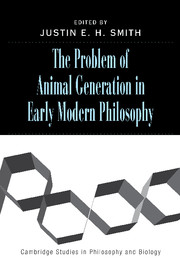Book contents
- Frontmatter
- Contents
- List of Contributors
- Introduction
- I THE DAWNING OF A NEW ERA
- II THE CARTESIAN PROGRAM
- III THE GASSENDIAN ALTERNATIVE
- IV SECOND-WAVE MECHANISM AND THE RETURN OF ANIMAL SOULS, 1650–1700
- 7 Animal Generation and Substance in Sennert and Leibniz
- 8 Spontaneous and Sexual Generation in Conway's Principles
- 9 Malebranche on Animal Generation: Preexistence and the Microscope
- 10 Animal as Category: Bayle's “Rorarius”
- V BETWEEN EPIGENESIS AND PREEXISTENCE: THE DEBATE INTENSIFIES, 1700–1770
- VI KANT AND HIS CONTEMPORARIES ON DEVELOPMENT AND THE PROBLEM OF ORGANIZED MATTER
- VII KANT AND THE BEGINNINGS OF EVOLUTION
- Bibliography
- Index
7 - Animal Generation and Substance in Sennert and Leibniz
Published online by Cambridge University Press: 06 August 2009
- Frontmatter
- Contents
- List of Contributors
- Introduction
- I THE DAWNING OF A NEW ERA
- II THE CARTESIAN PROGRAM
- III THE GASSENDIAN ALTERNATIVE
- IV SECOND-WAVE MECHANISM AND THE RETURN OF ANIMAL SOULS, 1650–1700
- 7 Animal Generation and Substance in Sennert and Leibniz
- 8 Spontaneous and Sexual Generation in Conway's Principles
- 9 Malebranche on Animal Generation: Preexistence and the Microscope
- 10 Animal as Category: Bayle's “Rorarius”
- V BETWEEN EPIGENESIS AND PREEXISTENCE: THE DEBATE INTENSIFIES, 1700–1770
- VI KANT AND HIS CONTEMPORARIES ON DEVELOPMENT AND THE PROBLEM OF ORGANIZED MATTER
- VII KANT AND THE BEGINNINGS OF EVOLUTION
- Bibliography
- Index
Summary
INTRODUCTION
Gottfried Leibniz is well known for his claim to have “rehabilitated” the substantial forms of scholastic philosophy, forging a reconciliation of the New Philosophy of Descartes, Mersenne, and Gassendi with Aristotelian metaphysics (in his so-called Discourse on Metaphysics, 1686). Much less celebrated is the fact that fifty years earlier (in his Hypomnemata physica, 1636) the Bratislavan physician and natural philosopher Daniel Sennert had already argued for the indispensability to atomism of (suitably reinterpreted) Aristotelian forms, in explicit opposition to the rejection of substantial forms by his fellow atomist Sébastien Basson.
In this essay I want to set Leibniz's philosophy in a novel perspective by comparing it with Sennert's anticipation of his reintroduction of substantial forms. And I shall be doing this by looking at motivations for his theory of substance in his views on biological generation. I shall be especially concerned with the genesis of Leibniz's views and therefore with the context of his youthful commitment to atomism in the period from roughly 1666 to 1678. And I shall argue here, by a comparison with the case of Sennert, that this atomism, rather than being irrelevant to his mature philosophy of substantial forms and monads, actually throws considerable light on it. For it turns out that, despite the huge differences in the contexts in which the young Leibniz and Sennert wrote and in the details of their views, there is a fair degree of commonality between the two in their motivations.
- Type
- Chapter
- Information
- The Problem of Animal Generation in Early Modern Philosophy , pp. 147 - 174Publisher: Cambridge University PressPrint publication year: 2006
- 5
- Cited by

